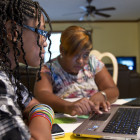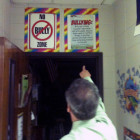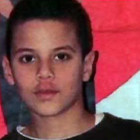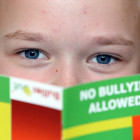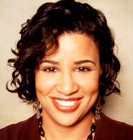
Me My Sister and the Bully
|
At age 12 we moved from a small town in Kansas to a suburb of Albany, .N.Y. Over the summer, I befriended another boy named Dean. On the first day of school, while at the bus stop in front of my house, a group of boys approached. When Dean saw them, he became visibly upset.
"What's wrong," I asked.
"That's Jeff and his gang." he said. "They're trouble."
It was not their bus stop. "This could not be good," I thought.
When they arrived, Jeff said something I couldn't make out, but I knew from his tone and body language that he wanted to pick a fight with Dean.
Having been raised to be chivalrous -- or some would say "stupid" -- I stepped between Dean and the gang and said something foolish that went something like "You will have to go through me."
They just looked at each other and laughed. I thought their laughter to be incredulous but at the same time praying my mother would look out the window and rescue me.
She didn't and I was contemplating, "Do I run toward the house or stay and get pummeled to death?"
Just before I turned to look at Dean, I was thinking, "At least I have my friend Dean."
But there was no Dean. He opted to do what I was just thinking, he ran!
I turned back around facing Jeff. He says to me, "What are you going to do now?"
Just as I was about to run, I heard a loud motherly voice. In that split second, I thought of my Mom -- but it wasn't her -- it was Dean's mom. He ran to get help.
"You leave now before I call the police," she hollered.
Jeff and his gang of thugs left, but they didn't forget.
A week later, I was standing in the back of a crowded bus. I felt a tap on my shoulder, I looked around and there Jeff stood with a hateful stare.
He slapped me across the face. I stood there and didn't move. His friends were standing around waiting for me to do something. I didn't. I was too scared.
They soon discovered I had a sister. She rode the same bus. It wasn’t long before they attacked her. That’s when my personality changed forever. I became a fighter.
I got into a lot of fights that year protecting my sister. The gang of bullies made sure to attack when adults were not around.
I took a beating physically and emotionally until it dawned on me that I could start my own gang. If Jeff can bully in numbers, I can defend in numbers.
My friends Mike, Louie, and John soon had my back. It didn't take long for Jeff to figure out that I wasn't worth his trouble. You see -- my friends were bigger and smarter.
I fought off my bullies because I was resourceful. Most victims are not resourceful. The research shows that many teachers are not aware of the frequency of bullying in the school. Much of it has to do with the bully's covert approach to harming others coupled with the victim’s failure to report the incidents of bullying.
Studies show that most don't tell on their attackers for a number of reasons. In a survey of post-secondary students, most students believed that teachers are not helpful and may make the problem worse by drawing more attention to the bully without taking effective steps to prevent further abuse. The bully is now aggravated and the attacks occur more frequently and with greater intensity.
Other reasons given include fearing retaliation, feeling shame at not being able to stand up for themselves, fearing they would not be believed, not wanting to worry their parents, having no confidence that anything would change as a result, thinking their parents' or a teacher's advice would make the problem worse, fearing their teacher would tell the bully who told on him or her and thinking it was worse to be thought of as a snitch.
What should we expect from kids who are under neurological construction? Their frontal lobe -- the part of the brain that translates emotion into logic -- is not developed until age 25.
For my sister and I, we didnt want our parents to worry. It’s an interesting paradox the love between a parent and child. My parents were nurturers. They were protective -- not overly so -- but always hugging, asking questions, and in our business.
Here is the rub -- knowing the extent of their love also meant knowing the anguish and pain they would experience if they knew our pain. They always told us we could talk to them and share problems, but we didn't always do that. Not because we didn't trust them, but because we loved them, in our cognitively short-sighted way.
In hindsight, my adolescent male ego was bigger than my immature frontal lobe. I didn’t want the bullies and others to witness my Mom in action to save me and my sister. I trusted my Mom to fix things but I didn’t want the embarrassment of being labeled a "momma's boy."
Ironically, my selfless chivalry was in part driven by my selfish need to avoid humiliation. Sadly, this irony placed my sister in harm’s way. I am sure she wasn’t concerned about mommy coming to the rescue. My emotions were not getting filtered through an objective lens to reach logical decisions. That's the nature of adolescence.
As I cull through the evidence-based approaches to combat bullying and look back on those dark days, I am convinced that the best approach is not zero tolerance, it's teaching the teachers to identify bullies coupled with programs designed specifically to assess and respond to their need to bully.
Otherwise, kids will continue to be traumatized. They will find their own way to deal with it. Some are resourceful -- most aren't.
The effects can be long lasting. Others simply try to take their own life -- and some succeed.
